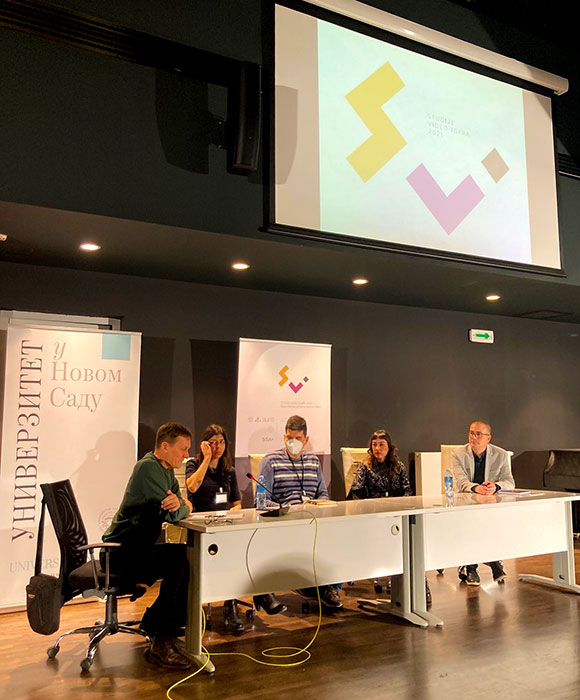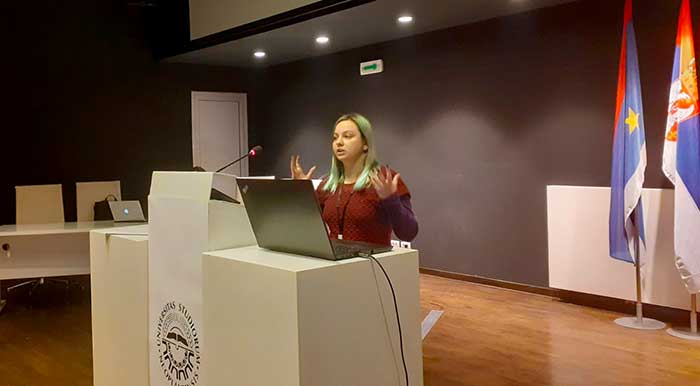SVI Conference 2022


GAME DESIGN STUDIES
Fourth International Video Game Studies Conference (SVI2025)
Bydgoszcz, Poland: December 1st-2nd 2025
SVI CONFERENCE

Game Design Studies
It has been almost a quarter of a century since Espen Aarseth proclaimed “year one” of computer game studies in the first issue of the Game Studies journal (Aarseth, 2001). During the intervening decades, game studies has expanded tremendously, with multiple journals, conferences and books emerging every year on a countless variety of topics related to games.
Game studies as a field has expanded in leaps and bounds. It first grew rapidly through the entrance of scholars from a wide variety of disciplines. In time, this highly multidisciplinary field brought up a new generation of scholars, trained in game studies from the ground up, teaching now-institutionalised courses in game studies and game design. Yet, even with this rapid expansion, the field has “suffered” from an embarrassment of riches – given the even faster expansion of games and game culture, there are always more topics and more games than researchers available to explore them.


In parallel to, but separately from scholarly game studies, and with an almost twenty-year head start, game designers have been publishing numerous works dealing with the theory and practice of game design. The two sides are aware of each other’s outputs, and certainly there have been some very notable cross-efforts, with designers such as Chris Crawford, Eric Zimmerman and Katie Salen, Richard Bartle, Ernest Adams, Tracy Fullerton, Gonzalo Frasca and Jesse Schell, among many, applying their design expertise to enrich game studies; in turn, scholars like Ian Bogost, Jesper Juul and Clara Fernández-Vara have at times ventured into game design. Such efforts at cross-pollination have the potential to develop into an additional subdiscipline in game studies – that of game design studies.
Game design studies as a focal point for research means combining the theoretical backdrop and sensibilities of game analysis with an interest in better understanding the practice of game design. This is still a very broad frame. Within it, we will certainly find examinations of game design as theory and practice, its historical developments, current challenges, and related theoretical frameworks such as game design patterns (e.g. Björk & Holopainen, 2005; Lankoski & Björk, 2007; Barney, 2020) and core mechanical building blocks (e.g. Engelstein & Shalev 2022). We may also find concentrated efforts to analyse specific games at greater depth, whether through the framework of gameplay, narratology, or otherwise, as well as explorations of game analysis methodologies (e.g. Aarseth, 2003; Fernández-Vara, 2024). Finally, we may also examine longer-term trends, searching for stylistic, authorial and industrial influences across groups of games, or analogously, patterns and practices local to a specific country, geographic area or culture.
The SVI Conference, as always, aims to be a bridge between the academic and industrial worlds. Having originated at the Academy of Arts in Novi Sad in Serbia, this year the conference is being co-organised with Kazimierz Wielki University, and will be held in Bydgoszcz, Poland. What connects these two institutions is their concentration on practical training; our students learn to design and to make games first, with game studies an important but secondary concern, allowing the practical to feed on the theoretical. Design feeds on analysis. We invite, therefore, analytical scholarship concerning game structures, design philosophy, gameplay, game narrative and worldbuilding, as well as current and historical analyses of design and development practices – all with an eye towards providing insights for a new generation of game designers and developers.

References
- Aarseth, E. (2001). Computer Game Studies, Year One. Game Studies, 1(1).
- Aarseth, E. (2003). Playing Research: Methodological approaches to game analysis. Retrieved from ResearchGate: https://www.researchgate.net/publication/228739348_Playing_Research_Methodological_approaches_to_game_analysis
- Barney, C. (2020). Pattern Language for Game Design. Boca Raton: CRC Press.
- Björk, S. & Holopainen, J. (2005). Patterns in Game Design. Hingham: Charles River Media.
- Engelstein, G. & Shalev, I. (2022). Building Blocks of Tabletop Game Design: An Encyclopedia of Mechanisms. Second Edition. Boca Raton: CRC Press.
- Fernández-Vara, C. (2024). Introduction to Game Analysis. Third Edition. New York: Routledge.
- Lankoski, P., & Björk, S. (2007). Gameplay Design Patterns for Believable Non-Player Characters. Retrieved from DiGRA Digital library: https://dl.digra.org/index.php/dl/article/view/262
SVI 2025
Keynote speakers
Clara Fernández-Vara
Clara Fernández-Vara is Associate Arts Professor at the Game Center at New York University; aside from her game scholarship, she is also a designer and writer, running the game writing and consultancy studio Fiction Control. Her work focuses on narrative design, and bridging game design and storytelling. Clara’s videogame work is grounded in the humanities, informed by her background in literature, film and theatre, which she now brings to new digital technologies. Her book, Introduction to Game Analysis, now in its third edition, is one of the key textbooks for game analysis.
Bruno Faidutti
Freelance boardgame designer of more than 40 board and card games
Themes
The conference will explore the topics in three major thematic blocks, which explore, first, game analysis proper, second, game design (understood as encompassing all of its subfields, such as level design and narrative design), and finally, the industrial and artistic contexts of game design and development. Additionally, we would like to focus not only on digital games, but all types of games, including board games, pen & paper RPGs and LARPs, to name a few. Suggested topics include, but are not limited to the following:

Game analysis
- Game mechanics, rules, and games as ludological constructs
- Game narratological analysis
- Game settings as worlds
- Case studies of games as works of art
- Comparative studies of games
- Formal, stylistic, thematic and generic analyses of games
- Longitudinal analyses of game series or groupings
- Game analysis methodologies

Game design
- Design-centric game analysis
- Game design patterns as objects of analysis
- Game design methodologies
- Game design history
- AI-assisted game design innovation
- Game design across game forms and genres
- Analysis of game design discourse
- Multidisciplinary aspects of game design

Industrial & artistic contexts
- Game designers as auteurs
- Game studios as collective auteurs
- Consoles, platforms and technological influence on game design
- Local, national and international game industry histories
- The search for national “schools of game design”
- Game design education, past, present and future
- Games as objects of memory and cultural or technological heritage
- Political contexts and their influence on game development past and present
SCHEDULE (PDF)
Monday 1st December -Tuesday 2nd December
Participation
Abstract Submission
Abstracts between 200 and 300 words in English, with up to 5 keywords, should be sent to [email protected] or through our Contact form before September 30th, 2025.
Important Dates
Submission Deadlines
Abstracts:
September 30th, 2025
Notification of Acceptance
Abstracts:
October 15th, 2025
Fee Payments Deadlines
October 25th, 2025
Full Papers
March 15th, 2026
Participation Options
Online and Live in English language (official language of the conference)
Registration Fee
Live attendance: 50 eur (lunch included)
Online attendance: 40 eur
Presentation Guidelines
In-person attendance (English):
- Presentation Duration:The oral presentations are 15 minutes, followed by 5-10 minutes of Q&A
- Presentations will be accepted in PDF, MS PowerPoint (*.ppt or *.pptx), or ODP files.
- Email us your presentation until December 28, 2025 at [email protected]
- Please, take with you a copy of your presentation to Novi Sad (USB-stick).
Online attendance (English):
- Online presentations have a duration of 15 minutes, followed by 5-10 minutes of Q&A
- Links for joining will be sent out before the conference.
Committee
Organizing Committee
- Jakub Majewski –Faculty of Cultural Studies / Kazimierz Wielki University in Bydgoszcz, Poland
- Dušica Dragin – Academy of Arts / University of Novi Sad, Serbia
- Jagoda Kościelniak –Faculty of Cultural Studies / Kazimierz Wielki University in Bydgoszcz, Poland
- Miłosz Markocki –Faculty of Cultural Studies / Kazimierz Wielki University in Bydgoszcz, Poland
- Paweł Stachowiak –Faculty of Cultural Studies / Kazimierz Wielki University in Bydgoszcz, Poland
- Krzysztof Chmielewski –Faculty of Cultural Studies / Kazimierz Wielki University in Bydgoszcz, Poland
- Piotr Siuda –Faculty of Cultural Studies / Kazimierz Wielki University in Bydgoszcz, Poland
- Irena Čučković – Academy of Arts / University of Novi Sad, Serbia Academy of Arts / University of Novi Sad, Serbia


Programme Committee
- Jakub Majevski –Faculty of Cultural Studies / Kazimierz Wielki University in Bydgoszcz, Poland
- Manojlo Maravić – Academy of Arts / University of Novi Sad, Serbia
- Jagoda Kościelniak –Faculty of Cultural Studies / Kazimierz Wielki University in Bydgoszcz, Poland
- Miłosz Markocki –Faculty of Cultural Studies / Kazimierz Wielki University in Bydgoszcz, Poland
- Piotr Siuda –Faculty of Cultural Studies / Kazimierz Wielki University in Bydgoszcz, Poland
- Filip Jankowski –Faculty of Cultural Studies / Kazimierz Wielki University in Bydgoszcz, Poland
Download
SVI 2025: Book of Abstracts

Contact Us
Feel free to send us your abstract or ask for any additional information.
Address
SVI Conference
University of Novi Sad, Rectory
21000 Novi Sad, Serbia
Dr Zorana Djindjica 1
sviconference.org | all rights reserved
